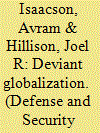|
|
|
Sort Order |
|
|
|
Items / Page
|
|
|
|
|
|
|
| Srl | Item |
| 1 |
ID:
148349


|
|
|
|
|
| Summary/Abstract |
In both Afghanistan and Iraq, US landpower was able to gain control rapidly over terrain. However, that control ebbed as US presence weakened. Non-state actors, such as the Taliban, the Haqqani network, the Islamic State, and Al Qaeda, gained control of segments of the population. Transnational Criminal Organizations capitalized on this permissive environment to strengthen their networks, often eroding the legitimacy of the host nation government, fueling regional instability, and, ultimately, undermining US policy objectives. The proliferation of deviant globalization, or the connectedness of subversive elements, is a key indicator of future conflict. Strategic landpower is uniquely positioned to influence the physical, psychological, economic, and social interactions of various non-state actors and their association with deviant globalization. It is no longer enough to seize and hold terrain. Landpower must also have the capability to influence the actions and attitudes of populations on that terrain wherever and whenever these interactions occur.
|
|
|
|
|
|
|
|
|
|
|
|
|
|
|
|
| 2 |
ID:
163259


|
|
|
|
|
| Summary/Abstract |
The representation of women as agents of violence matters. Scholars have shown those representations to be gendered and racially biased in a wide variety of contexts. So far, though, International Relations scholars have neglected a major part of women's violence in the global arena: women's involvement in organized crime. Scholars might neglect transnational criminal organizations (TNCOs) because in many cases they do not have an explicit political purpose, as do other organizations of extra-legal violence (such as militias, paramilitaries and/or terrorist organizations). This simple reading neglects the ways in which TNCOs influence state policies, engage with the creation of international norms and participate in (or contravene) the diffusion of international norms into domestic practices. This article makes the dual move, then, of taking TNCOs seriously as actors in global politics, and of taking women seriously as members and leaders of TNCOs. It does pay attention to how they are represented. But more than that, it explores their lives and the contexts in which they live or have lived. Rather than telling a story of female victimhood, this article tells a story of female agency. It concludes by arguing that seeing politically violent women as agents is not enough, nor is understanding the gendered context in which they live. Instead, politically violent women must be understood within gendered contexts. Analysis of female members of TNCOs both shows the unique features of TNCOs and provides a broader applicability for understandings of gender and of violence in the global political arena.
|
|
|
|
|
|
|
|
|
|
|
|
|
|
|
|
|
|
|
|
|